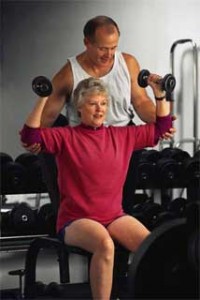Exercise is good news for everyone, even for people who are recovering from a serious illness. However, the level of physical activity that a person undertakes (including planned exercise) must be tailored to suit their capabilities. Information in a book can only be written in a general way, so before taking any form of exercise, particularly in the immediate post-operative period, all patients must check with their doctor first and be sure they understand what is suitable for them. As the carer you can help your relative to plan their exercise sensibly, perhaps with the advice of a physiotherapist who is skilled in rehabilitation and in helping people get the best from an exercise programme. Consider joining in – shared activity is much more enjoyable than exercising in isolation.
In the past people spent long periods in bed after a serious illness to allow the body to heal. Fortunately, this is no longer the practice and patients are encouraged to be more active at an earlier stage. Not all exercise need be strenuous, no one will suggest that your relative takes up hard jogging or squash. Start gently with a mild physical activity combined with lots of pleasure.
 Exercising safely
Exercising safely
Whichever activity your relative chooses, it’s important to be aware of a few safety rules, even with permission from the doctor.
– Start the regime gradually and build up exertion levels at a rate that feels comfortable; no one should behave as if they are training for the Olympics.
– Don’t exercise for at least two hours after a meal as the digestive system places an automatic demand on the blood supply to digest the food.
Wear clothes that are loose and comfortable and shoes or train¬ers that provide adequate support.
– Never rush straight into the most strenuous part of the activity, start and stop at a gentle pace to allow muscles to warm up and cool down before and after exercise.
– Drink plenty of fluids, but not alcohol as this increases dehydration.
– Stop immediately if there are any signs of breathlessness, chest pains or feeling unwell in any way; if exercise has caused prob¬lems, however minor, it would be wise to inform the doctor before continuing with the programme.
– Even mild increases in exercise may cause leg cramps for some people, particularly if this is after a long period of illness in which little activity or exercise has been possible. Your relative’s doctor will advise about taking exercise if leg cramps are painful.
